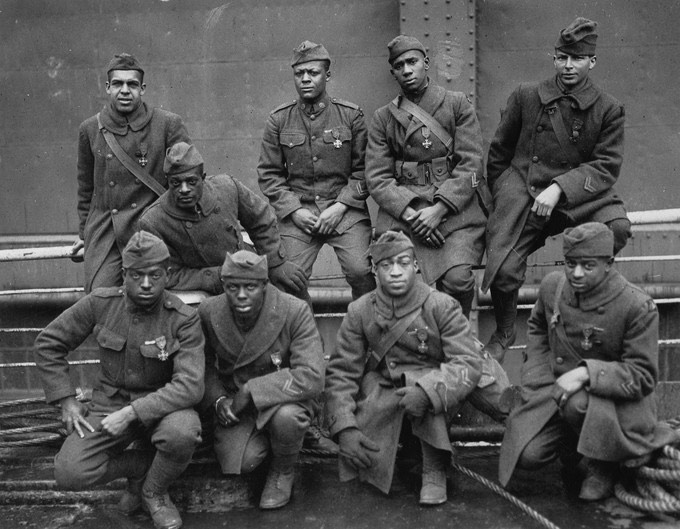Although the fight for civil rights started long before the Great War, the struggle for African American men and women intensified during the Great War. When the war came to the United States, African American communities felt that, if they could fight alongside their fellow white countrymen, the country would be more favorable to their quest for civil rights. When the government began calling for volunteers soldiers, 4,000 African American men signed up. At first, because black men could not fight in the white regiments and the protest of many white American men, the War Department refused the recruitment of any more African Americans. However, when the numbers of volunteer recruits did not reach the desired goal, President Woodrow Wilson signed the Selective Service Act on May 18, 1917 which required all men to register despite their color.

Once enlisted, African Americans suffered discrimination in treatment, facilities, and privilege. After training, the African American soldiers with the help of the NAACP had to advocate to train as officers. The government resisted with the excuse that there were no camps to train African American officers. After Joel Spingarn established a camp, African American soldiers were able to train and 639 out of 1,250 men passed. These soldiers also received second best shelter, clothing, food and supplies.
Black soldiers also faced ridicule from people of the towns surrounding their camps. When they went into town when off duty, hostile residents often treated these soldiers poorly. These situations often escalated violently. For example, the Houston Race Riot culminated in a violent exchange in which resulted in the death of sixteen white town’s people and four Black soldiers.Starting with the beating of a black woman and the beating and imprisonment of two black soldiers, African American soldiers marched to Houston and shot into the town. The incident ended with the hanging of 13 African American soldiers and the life sentences of 63 other soldiers out of the 110 soldiers convicted.
Discontent and anger rose among the African American soldiers and they wrote of their unfair treatment to the government and to their families. The lack of government concern for the unfair treatment of the black soldiers prompted outrage in the black community and increased the fervor in the fight for Civil Rights.
Once they arrived in France, the soldiers of both colors were amazed at the fair treatment African Americans received from their French allies. Despite the desire of the American military men to keep their soldiers segregated, the depleted French forces in need of relief were given the African American soldiers of the 369th infantry division. At first, it was a disadvantage for the 369th due to language barriers and adjusting to the different equipment. Casualty numbers among the African American troops were high and white American officers, ignoring the difficulties, reported that these troops were inept. However, as they got used to their new situation, being with the French troops gave the African American soldiers a taste of what equality from the French. Their French comrades invited the black troops back to their homes. They were able to fraternize with French women, many finding wives among them. The freedom they experienced in France enticed many of the African American soldiers to stay. Unfortunately, the situation remained unchanged between the white and black American soldiers while in Europe. Many times, black soldiers were relegated to jobs around the camp such as building barracks or unloading supplies rather than receiving combat assignments.
At the end of the war, 170 soldiers of the 369th were awarded Croix de Guerre by the French government for their bravery. However, no recognition for service was forthcoming from the United States government. Far from improved, the African American soldiers came home to an unchanged attitude towards civil rights and a dangerous environment for African American veterans. In fact at least 13 black veterans were lynched for their participation in the Great War. Yet, with more determination than before, increased focus on the fight for Civil Rights resulted.
By Suzanne Tetteh
Further Reading
Browne, George, and David L. Snead. An American Soldier in World War I. Lincoln: University of Nebraska Press, 2006.
Mjagkij, Nina. Loyalty in Time of Trial : The African American Experience During World War I. Lanham, Md: Rowman & Littlefield Publishers, 2011.
Scott, Emmett J. Scotts Official History of the American Negro in the World War. Washington: War Dept., 1919.
Williams, Chad Louis.Torchbearers of Democracy : African American Soldiers in the World War I Era. Chapel Hill: The University of North Carolina Press, 2010.